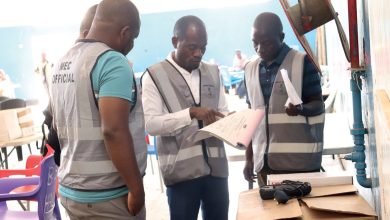NFRA maize price hike sparks market fears
The National Food Reserve Agency (NFRA) yesterday announced that it has increased the price it pays for maize from farmers in a bid to stop hoarding of the commodity, but economists and traders have warned that it may fuel inflation and worsen shortages.
Addressing the press in Lilongwe yesterday, NFRA chief executive officer George Macheka announced that effective yesterday, NFRA will pay K1 280 per kilogramme (KG) for maize in open and mobile markets, an increase from K1100, while registered mega farmers will get K1 300 per kg.
He said the increase was a direct response to a recent drop in maize deliveries to its depots.

Said Macheka: “In addition to supporting farmers, this initiative is also aimed at curbing food inflation. We want to ensure that maize produced in the country, especially by mega farmers, is procured by NFRA to support the national food reserve.”
He further stated that the Strategic Grain Reserve has so far bought 37 578 metric tonnes (MT) of maize, of which 8 978MT has been sent to the Department of Disaster Management Affairs (Dodma) for emergencies, while 1 376MT has gone to Admarc for price stabilisation.
To bridge a national deficit, Macheka said NFRA is importing maize from Tanzania at a cheaper cost of K943 per kg under a government-to-government deal, but stressed that supporting local farmers remains the priority.
NFRA received K30 billion from government for maize procurement out of a budgeted K40 billion.
According to Macheka, NFRA plans to buy 105 000MT of maize locally and has K7 billion left from the K30 billion it received from government for purchases.
He added that if hoarding continues, the agency has made arrangements to import 9 500MT from Tanzania at first , and another 42 000MT if the situation does not improve.
However, NFRA’s move to increase the buying price has been met with criticism from some stakeholders.
In an interview yesterday, Grain Traders Association of Malawi president Grace Mijiga Mhango said the new prices will not draw maize from private traders but encourage more hoarding.
She criticised NFRA of trying to outbid private traders, calling it an indication of a “serious knowledge gap” of the maize value chain, which relies on traders for logistics and financing.
On his part, economist Bond Mtembezeka warned that the decision will distort the market and accelerate inflation.
He added that the price hike would strain the national budget and that the real solution lies in boosting production, not market manipulation.
Farmers Union of Malawi president Manes NKhata was yet to respond to our questionnaire by press timer, but in an earlier interview in May she observed that the same farmers that were selling maize at a cheap price will soon be buying the same at a high price.
The development comes despite years of substantial government and donor investment in agriculture through programmes like the Affordable Inputs Programme (AIP).
Such multi-billion kwacha investment initiatives aimed at achieving food security have failed to break the vicious circle of hunger as the country faces yet another food deficit, raising questions on effectiveness of interventions.




